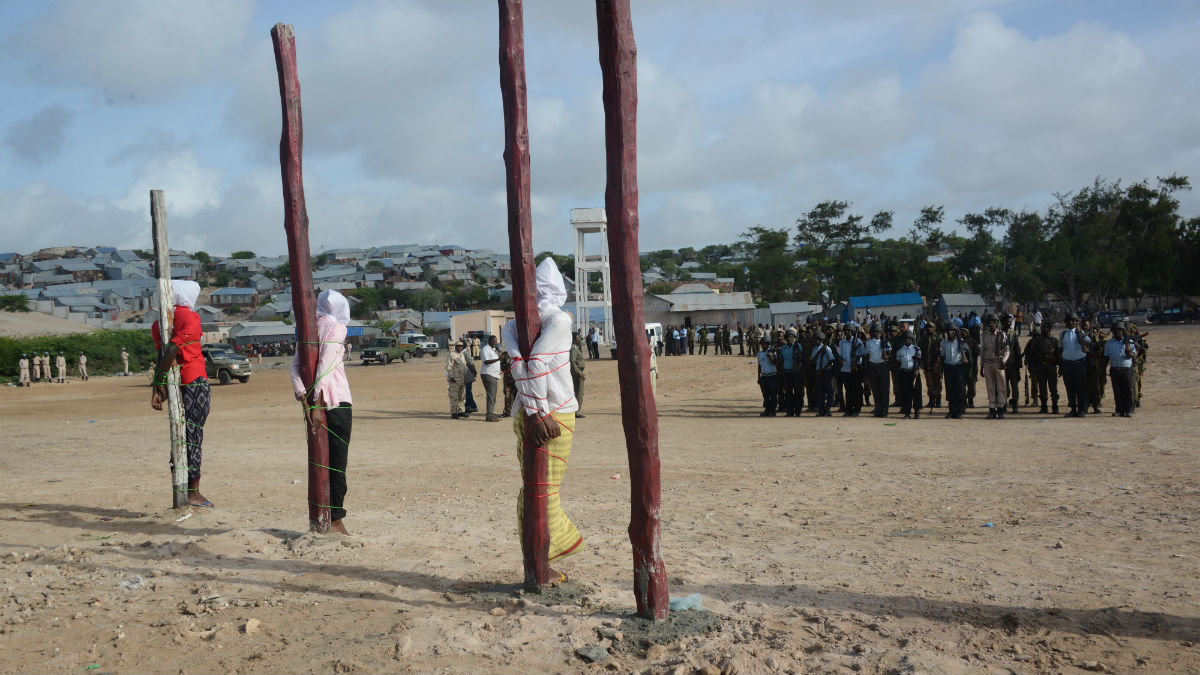Executions on the rise around the world
Amnesty International report records 'disturbing' increase in use of the death penalty

A free daily email with the biggest news stories of the day – and the best features from TheWeek.com
You are now subscribed
Your newsletter sign-up was successful
A spike in the number of executions recorded worldwide saw more people put to death last year than at any point since 1989, according to a new report from human rights group Amnesty International.
The total number of reported executions rose to at least 1,634 people in 2015, an increase of more than 50 per cent over the previous year.
"The rise in executions last year is profoundly disturbing," said Salil Shetty, Amnesty International's secretary general. "Not for the last 25 years have so many people been put to death by states around the world."
The Week
Escape your echo chamber. Get the facts behind the news, plus analysis from multiple perspectives.

Sign up for The Week's Free Newsletters
From our morning news briefing to a weekly Good News Newsletter, get the best of The Week delivered directly to your inbox.
From our morning news briefing to a weekly Good News Newsletter, get the best of The Week delivered directly to your inbox.
The world's "top five executioners" have been named as China, Iran, Pakistan, Saudi Arabia and the US, The Guardian says. However, Amnesty's report does not include figures from China nor North Korea, where records of executions are kept secret.
"Iran, Pakistan and Saudi Arabia have all put people to death at unprecedented levels, often after grossly unfair trials," Shetty added. Together, those three countries account for 89 per cent of executions listed in the report.
Iran put 977 people to death in 2015, mostly for "drug-related offences", said the human rights group, while Pakistan executed 326 people.
The country lifted its seven-year moratorium on the death penalty to "allow executions for terrorism-related offences" following the Taliban massacre in Peshawar in December 2014, CNN reports.
A free daily email with the biggest news stories of the day – and the best features from TheWeek.com
Chiara Sangiorgio, Amnesty's death penalty expert, told CNN that global unrest is a leading factor in the rise. "Many governments' responses to evolving security threats is leading to the unravelling of human rights protections around the world," she said.
But it isn't all bad news for anti-death penalty campaigners. "Four countries – Fiji, the Republic of the Congo, Madagascar and Suriname – abolished the death penalty for all crimes, reinforcing the long-term trend towards abolition," the Guardian reports, while Mongolia is also in the process of implementing a new criminal code outlawing execution.
-
 Political cartoons for February 16
Political cartoons for February 16Cartoons Monday’s political cartoons include President's Day, a valentine from the Epstein files, and more
-
 Regent Hong Kong: a tranquil haven with a prime waterfront spot
Regent Hong Kong: a tranquil haven with a prime waterfront spotThe Week Recommends The trendy hotel recently underwent an extensive two-year revamp
-
 The problem with diagnosing profound autism
The problem with diagnosing profound autismThe Explainer Experts are reconsidering the idea of autism as a spectrum, which could impact diagnoses and policy making for the condition
-
 Epstein files topple law CEO, roil UK government
Epstein files topple law CEO, roil UK governmentSpeed Read Peter Mandelson, Britain’s former ambassador to the US, is caught up in the scandal
-
 Iran and US prepare to meet after skirmishes
Iran and US prepare to meet after skirmishesSpeed Read The incident comes amid heightened tensions in the Middle East
-
 Israel retrieves final hostage’s body from Gaza
Israel retrieves final hostage’s body from GazaSpeed Read The 24-year-old police officer was killed during the initial Hamas attack
-
 China’s Xi targets top general in growing purge
China’s Xi targets top general in growing purgeSpeed Read Zhang Youxia is being investigated over ‘grave violations’ of the law
-
 Panama and Canada are negotiating over a crucial copper mine
Panama and Canada are negotiating over a crucial copper mineIn the Spotlight Panama is set to make a final decision on the mine this summer
-
 Why Greenland’s natural resources are nearly impossible to mine
Why Greenland’s natural resources are nearly impossible to mineThe Explainer The country’s natural landscape makes the task extremely difficult
-
 Iran cuts internet as protests escalate
Iran cuts internet as protests escalateSpeed Reada Government buildings across the country have been set on fire
-
 US nabs ‘shadow’ tanker claimed by Russia
US nabs ‘shadow’ tanker claimed by RussiaSpeed Read The ship was one of two vessels seized by the US military